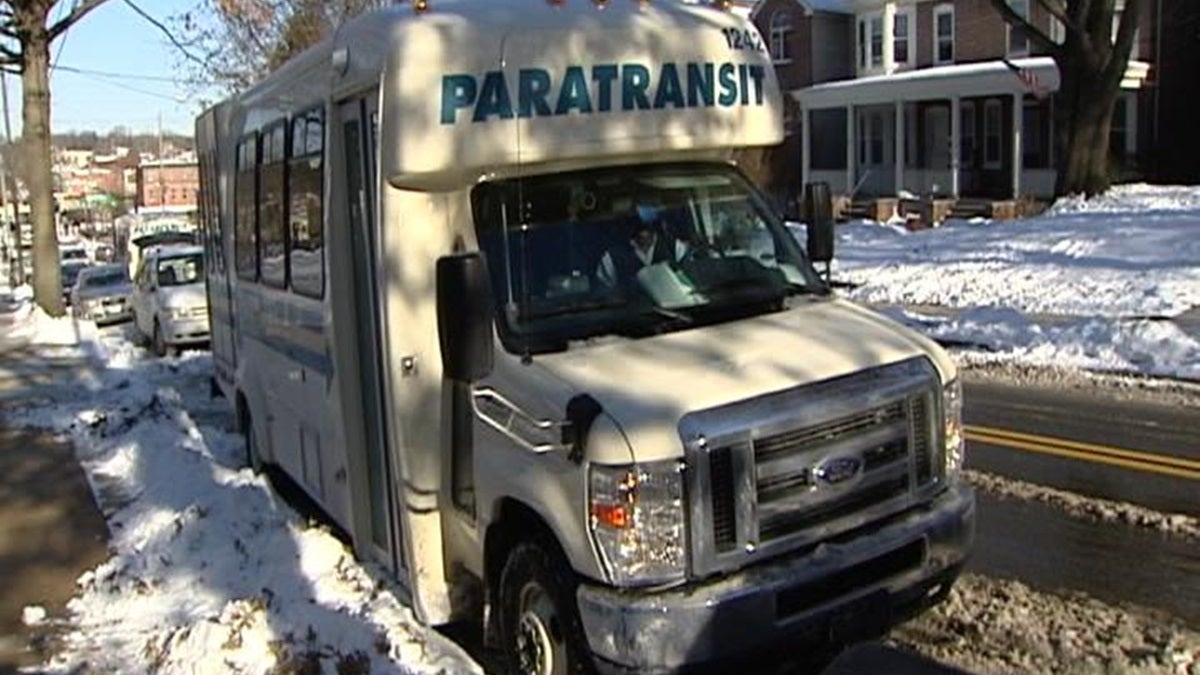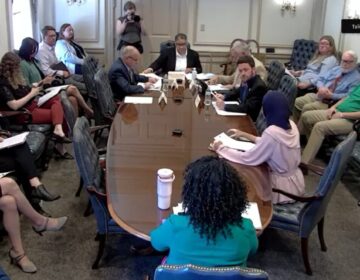Big changes for Delaware transit agency

(Gene Ashley/WHYY)
The Department of Transportation has called the redesign a “right fit” for transit customers, but some disability advocates aren’t convinced.
Bus fare in Delaware has stayed the same since 1989. Now, after more than two decades the cost of riding a DART bus in New Castle County will increase from $1.15 to $1.50 on February 9. The rate will increase to $2.00 by 2016.
While nobody’s happy about paying more, the fare increase for fixed-route service is the least controversial part of the change. Proposed changes for DART’s service for disabled residents on the other hand, is much more contentious.
Beyond ADA requirements
Right now, DART will pick up disabled residents anywhere in the state, even though the Americans with Disabilities Act only requires pick-ups for people within three-quarters of a mile of a fixed route bus. DelDOT Secretary Shailen Bhatt says expanding that service around the state has saddled the state’s service.
“Para-transit costs were $15 million back in 2000. They’re nearing $50 million next year. That is an increase of over 233 percent over a 13 year period.” Bhatt says most states spend 10 percent of their transit budget on para-transit. “There’s no other transit agency that would have 50 percent of their budget, or almost 50 percent of their budget [spent on para-transit]…We’re about to become a primarily para-transit agency, and that is just unsustainable.”
DART spends about the same on providing rides for about 8,000 regular riders as it does on the state’s roughly 30,000 fixed route riders. And despite that expense, Bhatt admits, the state is not providing good service.
“I get the calls and the letters from people that said, you were three hours late to pick up my daughter, my son can’t hold down a job because you can’t show up on time to pick them up,” said Bhatt.
Prioritizing trips
To improve service, DART will establish a priority program for scheduling rides outside of the ADA required service area, giving higher priority to rides for medical visits or work than other trips.
“At some point we’re going to have saying these trips have more importance, and other trips are going to have to wait until we have more flexibility in the schedule,” said Bhatt.
That’s a big cause of concern for disabilities advocates like Jamie Wolfe, who depends on a motorized wheelchair to get around. “For someone that relies on medication, someone who has issues like diabetes, and has to have certain types of foods at certain times, next week is not going to work,” Wolfe said. “My wheel chair is down, I’m totally helpless, I need to be able to go the next day.”
“It’s an issue of equity, and in a sense, civil rights,” said Beth Mineo, director of the Center for Disabilities Studies at the University of Delaware. “There’s too much of a tendency to treat it as a social services issue, it’s not, it’s an access to transportation.”
Mineo takes issue with the added expense the state will charge riders outside the ADA zone. Those fares will rise from two dollars to six dollars per ride by 2016. “Would we even think about someone who needs an accessible voting booth, having to have them have to pay extra to vote just because they have to be accommodated?”
Wolfe says more improvements in fixed route service could reduce demand for para-transit service. “DART is more expensive because they’re not providing the fixed route to give people a real alternative to the para-transit, so people have to use para-transit.”
The state has delayed the start of changes for para-transit service until mid-year in an effort to make a smoother transition. Bhatt says he understands that riders are worried. “Something that I actually struggle with is that this is actually going to impact people. To me, I don’t just view this as a numbers game, I realize that people are impacted by this.”
He wants to ensure riders understand, “We’re still going to pick everyone up. We’re still going to get everyone to their destination. We’re just going to do it smarter, and we’re going to do it in a way that is more cost effective.”
The Center for Disabilities Studies’ advisory council wants for DelDOT to rethink the change. “It just seems to make sense to stop and slow down and think these things through before they put forward changes that are going to change people’s lives,” said Mineo.
Alternative plans
While DART leaders believe prioritizing trips outside of the ADA zone will help alleviate some of the service problems within para-transit, there are also some other ideas on the table.
Those alternatives include a voucher program for a taxi service that would give riders a $20 dollar voucher for a taxi ride. While that might sound expensive, consider that DART already spends $47 dollars per para-transit trip, while only charging a $2 fare right now. The taxi-pilot plan is something that wouldn’t necessarily work for people who need a special vehicle, but it could reduce para-transit demand from other riders.
The fare increase for fixed-route service will go into place February 9. Para-transit fares will go up on July 1. The trip prioritization model will take over after September.
WHYY is your source for fact-based, in-depth journalism and information. As a nonprofit organization, we rely on financial support from readers like you. Please give today.





